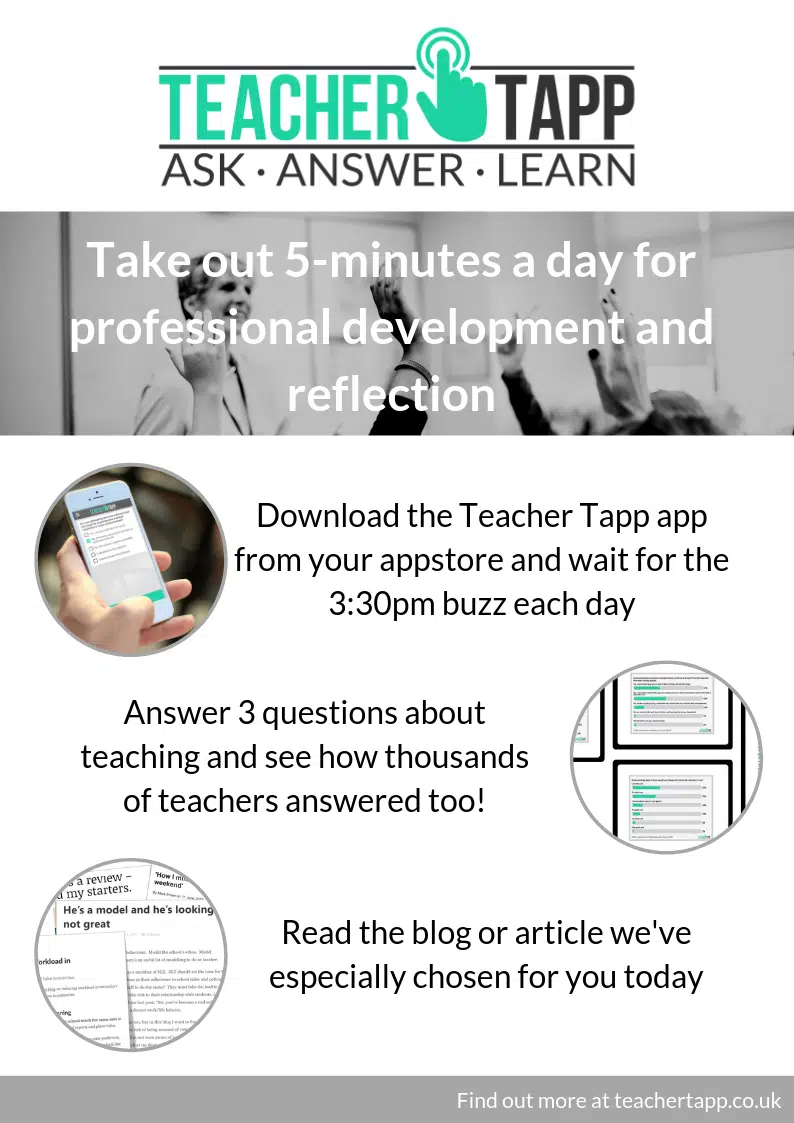Some of our strangest questions come from teachers, and this week’s CPD on the issue of toilet training was one of those.
Toilet doors are valuable visual ‘real-estate’ in schools, and when we visit them we are intrigued to see what sorts of things schools want students and staff to read (safeguarding details are very popular in our experience).
So, why not CPD materials in the toilet?! Well, it turns out, not everyone loves the idea. Almost 40% of teachers felt the idea of being trained while on the toilet was ‘intrusive’.

This is one situation where older teachers are most curmudgeonly! (And no, this isn’t about job seniority or experience, the most striking pattern is by age.)

So, if you are the CPD coordinator in your school, should you put research articles in the lav? We think it is still worth considering, though we’d prefer you displayed our Teacher Tapp poster! Older teachers will probably live with it, given they are forced to live with hundreds of new initiatives that schools introduce each year. And, who knows? If they do end up in the ‘learning cubicle’, they might even learn something!
Tests vs Teacher Judgement: What’s in an exam?
Another teacher wanted to know whether you all would consider a 45-minute test to be a better judge of pupil attainment than your own opinions based on your experience of the child.
It was fascinating to watch the responses to this question on Twitter. Science and maths teachers seemed astonished that anyone would trust their own judgement, which nicely aligned with your responses. Primary teachers are far more likely to think their judgements are fairest and most accurate, whereas most maths teachers put more faith in tests (though it’s not as many as you might think!).

Ultimately, we know that short tests are more objective and less prone to bias. They are great measures of pupil attainment where the subject knowledge domain is conducive to testing reliably in a short test (i.e. maths and science).
HOWEVER, a primary teacher who spends 30 hours a week with their students is unlikely to learn a great deal more from a short assessment than they already know about their pupils, given how much time they invest in looking at their work and how much more variable pupils are in their assessment outcomes at younger ages.
Finally, we also wondered whether senior leaders were more positive about tests since they feel like more ‘objective’ information to load up into their tracking systems. But the answer is no! This feels like good news to us – a sign that teachers and leaders can have healthy conversations about pupil attainment.

Trapped by the money?
We’ve before whether you would leave teaching if you could match your current salary, as research shows that teachers often take a pay cut when they leave teaching.
It’s easy to be shocked that over half of teachers would consider leaving for a job that matches their current salary. But let’s keep it in perspective – most people in most careers get a little trapped by their sector-specific skills and many people would like to try out other jobs, given half the chance.
A change is as good as a break, so it doesn’t mean you hate teaching!

Those of you in the north of England are much more likely to agree with the statement – which is logical since wages outside teaching are much lower where you are compared to other parts of the country.
Those of you with less than five of experience are more likely to disagree – chances are your teaching wages isn’t yet high enough to limit outside opportunities. And, intriguingly, those teaching in private schools seem much happier to stay in teaching, regardless of other opportunities available to them.

Are you a ‘teacher’ or are you a ‘maths teacher’?
We asked the secondary teachers whether they would leave the job if they were forced to teach outside their subject.
Actually, most teachers would be OK with doing this, which is lucky since many of you are already having to!

HOWEVER, Maths and Arts/DT teachers would be most unhappy to teach other subjects. Any ideas why?
This is especially surprising seeing as English and humanities teachers are those most consumed in their subject discipline that they read related books in their free time. Although, we guess it would be hard to be an English teacher if you didn’t like reading a lot!

The booming industry of private tutors
It’s hard not to notice how huge the private tutoring industry has become, but it is very hard for policy-makers to quantify its size or its impact on education.
We weren’t quite sure whether you knew if students were receiving private tuition or not, so tentatively asked our first question on it.
It seems that most of you are teaching at least one student who receives private tuition and there is a social gradient to this. Private sector primary schools report a high incidence of tuition, presumably because so many children are preparing for selective entry to their next school. In state schools, the reported rates of tuition are lowest in schools serving poorer communities.
If part of the progress gains in affluent schools is thanks to higher incidence of private tuition, why are we gifting those gains back to the school in their performance ratings?

Right, that’s all for this week folks. Time to review any articles you missed in our tips last week…
- Avoiding lethal mutations
- Multiple intelligences theory
- Questions to ask at interview
- Constructivism
- CPD on the toilet
- Talking positive

And don’t forget to tell your teaching colleagues all about Teacher Tapp!
We’ve even got a poster to put in your staffroom or staff toilet.





